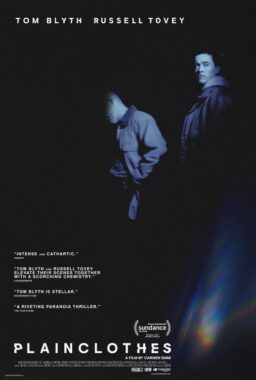Q. Just heard that Mike Nichols is planning to do a remake of “Kind Hearts and Coronets,” starring Robin Williams and Will Smith. Nichols is quoted as saying he plans to “change the main theme from class struggle to race relations, and change the ending.” How, then, is this a remake? (Ken Bearden, Wyandotte, MI)
A. I am reminded of Jack L. Warner’s decision to make a film on the Lindbergh kidnapping: “Only we have to change the name, of course. And it can’t be about kidnapping, because that’s against the Production Code. Also, the kid’s father shouldn’t fly.”
Q. A group is protesting “Me, Myself & Irene” because in their opinion it reinforces negative stereotypes about schizophrenia. The group claims it wants to educate people on this issue. So why can’t they do it and allow the general public to decide for itself whether to see the movie? I have an uncle who is schizophrenic. It is a sad disease, and it handicaps people and impairs them on many levels. But it wouldn’t stop him from recognizing comic ideas and wit. What’s wrong with people? There simply isn’t a bone of wit or irony left in anyone’s bodies. (Paul West, Seattle)
A. I am reminded of the protests about Mr. Magoo’s near-sightedness. I believe audiences are smart enough to know the difference between comedy and real life.
Q. The Answer Man column was asked how actors can be shown in close-up snorting cocaine. Your response only explained how a director used a small vacuum cleaner to get a close-up. Interviewed about his drug film, “Bright Lights, Big City,” Michael J. Fox said a special type of sugar was used. What he wasn’t told is, the sugar melts and later that night he discovered the less-than-glamorous side of acting when the syrup flowed freely from his nose. (Ted Miller, producer, WBAY.com)
A. Quite right. Howard Jackson of Kent, Ohio, also writes me to note than on the “Easy Rider” DVD it’s explained (or claimed) that Peter Fonda is snorting powdered sugar.
Q. I want to recommend The Rise of the Image the Fall of the Word by Mitchell Stephens. The book deals with the new editing style of “quick cutting”–the extremely rapid change from one shot to another with very little time spent on any one shot. This style is becoming common in action movies (“Armageddon,” “Gone In 60 Seconds,” “Shaft“) but not in “Mission: Impossible II.” My wife and I have found that this technique separates us from what we are seeing on the screen and prevents us from becoming involved. It makes the suspension of disbelief difficult or impossible. Much as I have always hated the French style of lingering over a scene long after it should end, it is preferable to quick-cut sequences which leave me totally unsatisfied. “Shaft” left us devoid of any feeling other than boredom. (Prof. Richard J. Gaylord, University of Illinois, Urbana)
A. Quick cutting is often associated with an action film which either has no real story, or no confidence in it. The relative failure of “Gone In 60 Seconds” indicates some moviegoers may be getting fed up. There is little time for involved dialog, and thus for characterization; the heroes of the movies are more like action figures than traditional movie characters. Sometimes quick cutting works as part of an overall strategy (as in Oliver Stone’s “Natural Born Killers“) but more often it is an attempt to supply with style what is missing in content.
Q. I’m a loyal Howard Stern listener, but wanted to tell you that you are right and he is dead wrong about “High Fidelity.” I loved this movie! In the John Cusack character I saw just about every guy I’ve ever dated–telling himself (and his buddies) one thing and acting in a totally unrelated manner. (Bonnie Cameron, Memphis, TN)
A. Stern raked me over the coals during a recent visit to his show because I liked “High Fidelity.” This from the man who loved “Outside Providence.” Nuff said.
Q. The film that most shocked me with its absence from the AFI 100 Funniest List was “Ferris Bueller’s Day Off,” which I consider the pinnacle of the 1980’s teen comedy boom, and one of my top 10 of all time. “Beverly Hills Cop?” “Mrs. Doubtfire?” “City Slickers?” I’d swap “Ferris” for one of those. (Greg Dean Schmitz, creator, Upcomingmovies.com)
A. Your letter is one of countless communications I received asking why various titles were or were not on the list. The important thing to remember is: This list is completely meaningless. The same voters, polled today, would probably list several different titles. How much thought can the average voter give while ticking off titles from a list of 400 finalists? I’d love a statistician to compare the titles with the frequency of the first letters in the names of a cross-section of movies, to see if (as I suspect) films toward the top of the alphabetical list had an advantage. The list is useful for video rental ideas, and to raise money for the AFI, and that’s about it. Still, I have been impressed over recent years by how many people have told me “Ferris Bueller” is one of their favorite films. It is gaining a cult following.
Q. That “Kid” you wrote about from Sundance a couple of years ago–the one who ambushed you in a coffee shop by bribing the bartender to put his video on the big screen–whatever happened to him? (Pet Danforth, Oak Park, IL)
A. The Kid was named Stuart Acher. He got an agent, has made some deals, says he’s on the brink of big things. Meanwhile, “Bobby Loves Mangos,” the film he showed to me, is playing this month at www.ifilm.com. It is, as I wrote at the time, surprisingly good. (While you’re at ifilm, also check out “405, ” by Bruce Branit and Jeremy Hunt. Take my word for it.)











